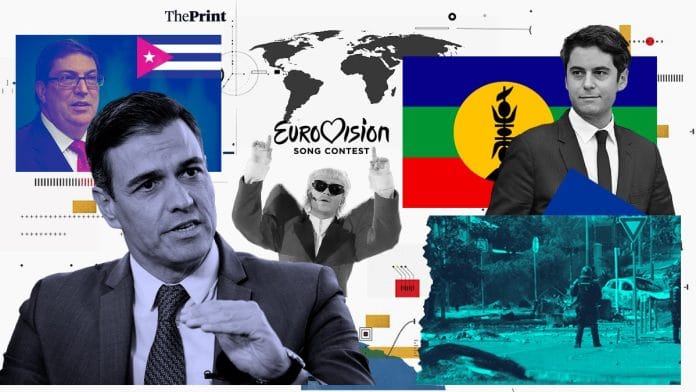New Delhi: Riots erupted in New Caledonia, a French overseas territory in the Pacific Ocean, following a proposed amendment to the French Constitution that aims to alter local voting rules. The French government has declared an emergency in the territory and deployed over 1,800 security officers. Focus has been attributed to securing key infrastructure, including ports and the airport.
Prime Minister Gabriel Attal has emphasized the need to restore “order, calm, and serenity.”
The electoral amendment is expected to permit French residents who have lived in New Caledonia for over ten years to vote in provincial elections. Many pro-independence Kanaks see this move as a threat to their political influence. As of 2019, New Caledonia’s natives — the indigenous Kanak population — make up about 40 percent of the island’s 270,000 residents whereas Europeans constitute about a quarter of the population while other communities such as Tahitiens, Indonesians, Ni-Vanuatu, and Vietnamese account for than 8 percent of the population.
The French annexed the islands in 1853, and there have been multiple calls for independence. notably escalating in the 1980s. The Nouméa Accord of 1998 granted limited autonomy to New Caledonia, and to date, three referendums have taken place in the region.
New Caledonia remains a crucial strategic location for France in the Indo-Pacific region, adding another layer of complexity to the ongoing unrest and calls for greater autonomy or independence. While the French president said he would delay the approval of the bill and invite representatives from the territory to discuss the issue further, he hopes to reach an agreement by June.
Also Read: Hong Kong govt’s bid to ban a protest song, Xi’s Eurotrip & other global news you may have missed
US removes Cuba from ‘Counterterrorism Non-Cooperation List’
The United States State Department Wednesday removed Cuba from its list of countries not fully cooperating with counterterrorism efforts, marking a significant shift in their diplomatic relations. This change comes after over six decades of strained ties between the two nations and follows two major developments.
The fist development was that in 2023, the US and Cuba resumed law enforcement cooperation, including counterterrorism. The second was Cuba’s decision to engage with Colombia on extradition requests for members of the National Liberation Army (ELN).
The ‘Not Fully Cooperating Countries (NFCC)’ list still includes North Korea, Syria, Iran, and Venezuela.
In his response to the development, Cuban Foreign Minister Bruno Rodríguez P. took to X and said: “The US has just admitted what is well known to everyone”. He also asked for the removal of Cuba from the list of states sponsoring terrorism or the SST list which Cuba is still a part of.
The US has just admitted what is well known to everyone: #Cuba fully cooperates with efforts against terrorism. Any political manipulation of this issue must cease.
Cuba's arbitrary and unjust inclusion in the list of States sponsors of terrorism must end.
— Bruno Rodríguez P (@BrunoRguezP) May 15, 2024
Dutch singer banned from Eurovision but church bells play his melody
Hours before last Saturday’s grand finale of the Eurovision Song Contest, Dutch singer and rapper Joost Klein was disqualified for having allegedly intimidated a female member of the production crew.
While the Swedish police are involved, the decision, made in the Swedish city of Malmö, has sparked a contentious disagreement between the event’s organisers and Dutch broadcaster Avrotros—Klein’s representatives. The broadcaster called the decision “very heavy and disproportionate” and that Klein repeatedly indicated he did not want to be filmed but did not touch the crew member.
Meanwhile, in the Netherlands, people have come out in support of their favourite artist with radios and church bells playing Klein’s melodies alike.
Socialists win elections in Catalonia in Spain, and Right-wing parties to form a coalition govt in the Netherlands
Spanish PM Pedro Sanchez’s Socialist Party (PSC) has emerged victorious in Catalonia’s regional elections, winning the biggest share of votes in Sunday’s elections. The PSC’s Catalan wing, led by former Spanish health minister Salvador Illa, secured 42 seats in the 135-seat chamber, outpacing the pro-independence party Junts, which won 35 seats. Carles Puigdemont, leader of the Junts per Catalunya, campaigned while in exile in France.
This could be seen as a blow to the independence movement as nationalist parties lost support, and for the first time, the autonomous region of Spain was led by a party opposed to independence.
However, the majority threshold is 68 seats, and Illa will have to gather support through a coalition. “The Catalans have decided to open a new era.” Salvador Illa said as he claimed history.
Meanwhile, in the Netherlands, a four-party Rightwing coalition government has been formed after protracted negotiations. Concluding months of uncertainty, Geert Wilders, known for his anti-Islam stance, has struck a deal with three other parties — outgoing Prime Minister Mark Rutte’s Center-Right VVD, the conservative NSC party, and farmers’ protest party BBB. Together, they have a majority of 88 seats in the 150-seat lower house of parliament.
The coalition’s platform, under the slogan ‘Hope, courage, and pride’, includes plans to impose strict measures on asylum seekers, end family reunification for refugees, and reduce the number of international students. This marks a sharp rightward shift in Dutch politics.






